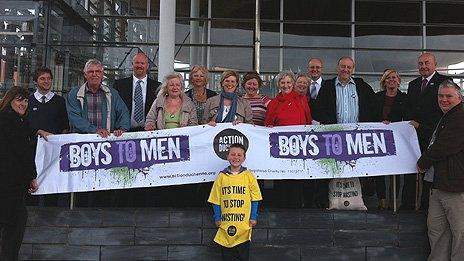Duchenne muscular dystrophy: Parents call for Welsh centre
- Published

A rally was held by campaigners outside the Senedd on Tuesday
Parents of children with a muscle wasting disease have called on ministers to create a specialist centre to help sufferers in Wales.
Duchenne muscular dystrophy affects around 120 families in Wales but the only UK centres are in England.
Charity Action Duchenne said a new facility could improve the quality of life and lifespan of sufferers.
The Welsh government has said it is working to improve services and support for those with muscular dystrophy.
Duchenne muscular dystrophy is the most severe of the muscular dystrophies, according to the Action Duchenne charity.
The charity said the disease, which affects mainly boys, was 100% fatal.
Sufferers are diagnosed usually by the age of five and without good medical intervention they rarely live beyond their late teens and twenties, it said.
Wales was the only country in the UK to screen newborn children for the condition, but screening was withdrawn at the end of November.
The Welsh government said the test was no longer reliable.
Around 100 parents and campaigners gathering at the Welsh assembly on Tuesday are also seeking matched funding to support new research that could deliver a cure for the disease in the next few years.
Nick Catlin, of Action Duchenne, said advances in medicine made a longer lifespan and improved quality of life for all young men living with Duchenne "a real possibility".
"It is a critical time to invest in research for treatments that will see the condition stabilised to enable our young people to live longer," said Mr Catlin.
He added: "Without further funding and government support we cannot achieve our goal of providing personalised care and support into adulthood to improve the quality of life for those living with Duchenne."
'Waiting game'
John Burke, who lives in Cardiff and whose three-year-old son, Seth, has the disease, is among those taking part in a lobby at the Welsh assembly.
He told BBC Radio Wales that from the outside Seth looked just like a normal, happy, healthy little boy.
But he added: "Unfortunately for me and his mum it's just a waiting and watching game.
"It's a progressive illness. We know that things will get worse in time. Boys start to lose their mobility, they start to fall over. Quite early on boys are in wheelchairs before they reach their teenage years.
"It then starts to affect the rest of their muscles and that particularly includes their respiratory muscles, their heart, the major muscles of the body and that all needs lots of attention, lots of specialist care to look at."
Mr Burke said a specialist centre in Wales would give Seth access to all the help he needed, all under one roof.
"You get to see respiratory physicians, cardiac physicians," he said. "You get to see experts in neuro-muscular conditions."
Mr Burke said Wales should follow the Danish model of treatement, where men were living into their 30s and 40s as opposed to the average life expectancy of 19 to 21 in the UK.
In May, Welsh health minister Lesley Griffiths said the Welsh government was working to improve services and support for individuals and their families who are living with muscular dystrophy.
Ms Griffiths said she was committed to ensuring that all patients with conditions such as muscular dystrophy had personal care plans.
She added that clinical staff had said further investment should be used for specialist occupational therapists and psychology staff.
- Published24 January 2012
- Published13 January 2012
- Published17 November 2011
- Published25 July 2011